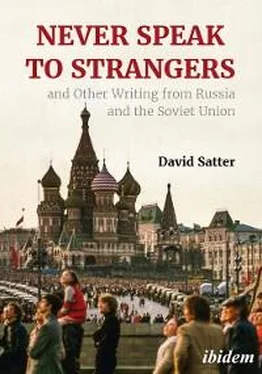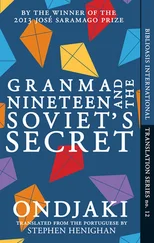Cautionary placards at the station and airport greet visitors to Sochi who are also met with anti-smoking propaganda in the sanatoria and rest homes where many spend their holidays. On arrival in the sanatoria, they’re asked whether they want to give up smoking. Those who try, inspired by the aura of good health and clean living, either do so unaided or with the help of medicines that help over withdrawal by imitating the effects of nicotine.
The treatment in the Sanatoria is largely psychological. Doctors discuss the harmful effects of smoking with those who want to stop the habit and there are discussion groups. Those who succeed are given a certificate congratulating them on their willpower and doctors at the sanatorium write to them to avoid a relapse.
In Sochi omnipresent posters proclaim that “work, rest and medical treatment are incompatible with smoking.” The campaign is supported by articles in the newspapers and programmes on radio and television. Smoking is banned in cinemas, hotels and public buildings, including the Sochi town hall. Kiosks that sell cigarettes also display antismoking literature.
This total approach to combatting smoking works well in a resort where the healthful atmosphere, nearby mineral springs, and the break in the work routine, encourage people to try to stop. An estimated 200,000 persons a year are now giving up smoking in Sochi, though only 10,000 succeed for good.
Other towns could follow the example. Exhortatory public propaganda is almost as common in Russia as advertising is in the West, so a national antismoking campaign would be both feasible and in character. The Soviet Health Ministry is concerned about the increase of smoking in the country, and particularly, the use of tobacco by schoolchildren. Literatarnaya Gazeta , the writers’ union weekly, has called for health warnings on cigarette packages, a ban on cigarette sales in grocery shops and from newsstands, and the elimination of inducements to smoke such as scenes of cinema stars smoking.
Oddly, the campaign has apparently met bureaucratic obstacles from ministries responsible for growing tobacco and making cigarettes. Per capita cigarette consumption by persons over 18 in 1974 was estimated to be only 60 per cent of that in the U.S., a tribute perhaps to Russia’s lack of cigarette advertisements, but consumption is rising and tobacco production is a 4 bn. rouble a year industry. According to Literaturnaya Gazeta , trade officials recently opposed the proposed inclusion of a health wanting in each cigarette packet and the Ministry of Light Industry, which oversees 54 tobacco factories, and the Ministry of Agriculture, which oversees 189,000 hectares of tobacco crops, are other potential sources of opposition to stringent anti-smoking measures.
More than 20 brands of cigarettes are on sale in Moscow and many more in the national republics. The most popular appear to be Yavaplain and Stolichnaya filter cigarettes at 30 Kopecks (about 33 pence) for 20. The Apollo-Soyuz brand, commemorating the joint U.S.–Soviet space flight, also appears popular, probably because of its American association and the American tobacco of which it is made, but is hard to get.
Cigarettes imported from the West are only sold to foreigners for hard currency.
The potent papirosi, production of which is to be cut one third by 1980, sell for 22 Kopeks for 250. There have been efforts to create tobacco substitutes but after unsuccessful attempts to make something smokable out of such substances as cellulose, sawdust, cabbage leaves, beetroot, dandelion leaves and pollen, the tobacco industry has given up. Scientists in Kiev, however, have designed a special cigarette holder which may go into wider use. It contains pills made of baked metal powder which act as a filter and are said to retain up to 75 per cent of the most harmful components of cigarette smoke drawn through the holder.
Financial Times, Friday, November 25, 1977
The Soviet strategy on dissidents
While the debate in Belgrade has been going on about Soviet human rights abuses, the Soviet authorities have continued to pursue a strategy intended to make dissent a largely academic issue.
During the course of this year, a wave of arrests and many approvals of requests to emigrate have succeeded in so depleting the dissident ranks that they appear to be greatly weakened for the foreseeable future.
Twelve members of citizens’ groups which sought to monitor Soviet observance of the 1975 Helsinki agreements have been arrested or sentenced since February of this year. In Moscow, those arrested were Dr. Yuri Orlov, the leader of the Moscow-based group, and members Alexander Ginzburg and Anatoly Shcharansky, who faces treason charges. A fourth member, Malva Landa, was sentenced to two years exile in the Soviet Far East for negligence in connection with a fire in her apartment last December.
In the Ukraine; there have been four arrests of members of the Ukrainian-Helsinki group including Mr. Mikola Rudenko, the group leader, and Mr. Olexy Tikhy, who were convicted in July of anti-Soviet agitation. The only Helsinki group members so far convicted on political charges.
Mr. Rudenko, a Ukrainian poet and war invalid, was sentenced to seven years hard labour and five years exile. Mr. Tikhy was sentenced to ten years hard labour and five years exile. There have also been three arrests of Georgian Helsinki group members. And in Lithuania; Viktorus Petkus, head of the Lithuanian Helsinki group, was arrested this summer.
Manv dissidents have been induced to emigrate. Gen. Pyotr Grigorenko leaves next week on a six month visa for medical treatment in the U.S. Gen. Grigorenko insists that he will come back to the Soviet Union and said he regards the granting of the visa as “a humanitarian act.” Once in the U.S. he may be stripped of his citizenship and refused permission to return.
The departure of Gen. Grigorenko, Moscow’s best-known dissident after Dr. Andrei Sakharov, will follow the recent emigration of Dr. Valentin Turchin, leader of the Soviet branch of Amnesty International, who accepted an offer to leave after being unable to find work for three and a half years, and the emigration of Tatyana Khodorovich, the last remaining director of a fund to aid political prisoners, who decided to leave after being threatened with criminal charges.
Other dissidents who have emigrated in recent months include Lyudmilla Alexeeva and Yuri Mnyukh, both former members of the Moscow based Helsinki group, and Kronid Lubarsky, an astronomer who helped Mrs. Khodorovich manage the fund to aid political prisoners.
The Soviet dissident movement appeared in its present form in the late 1960s and has suffered repeated repressions since then. But never before has it lost so many of its key personalities in such a short time. Dr. Sakharov is now almost the only major dissident still active in Moscow and the absence of other well-known personalities such as Dr. Orlov, Mr. Ginzburg, and in a few days, Gen. Grigorenko, removes men whose wide contacts made them invaluable sources of information about human rights abuses throughout the Soviet Union.
The tactics being used against the dissidents are sometimes brutal. But, as a rule the KGB attempts to suppress dissent with a minimum of violence. This can be done by arresting some people, allowing many others to emigrate and making the choice between emigration and arrest almost a matter of whim. Dissidents speak of the “black box” which contains their fate. It is impossible to say with certainty, for example, why Anatoly Shcharansky was arrested and faces treason charges while Dr. Turchin, who succeeded him as the principal dissident spokesman, was allowed to emigrate to the U.S. The inability of the individual to predict the reactions of the KGB, predisposes him toward restraint.
Читать дальше












